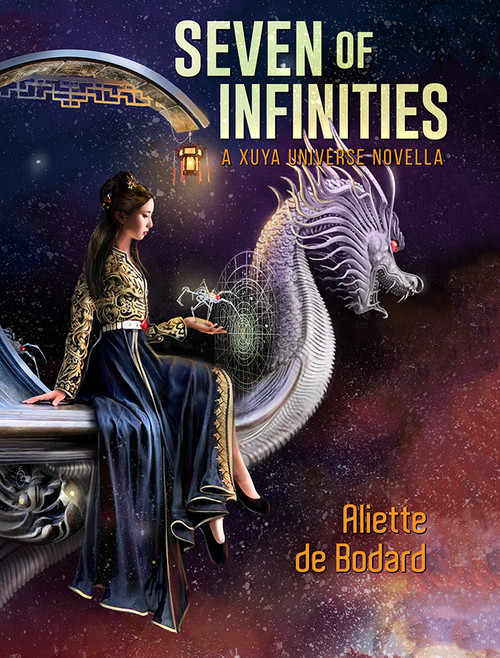all ebooks sold through our website are DRM-Free and in epub format
Cover illustration by Maurizio Manzieri.
Aliette de Bodard follows up her award-winning Xuya universe novella, The Tea Master and the Detective with Seven of Infinities, an even longer foray into her singular creation.
About the Book:
Vân is a scholar from a poor background, eking out a living in the orbitals of the Scattered Pearls Belt as a tutor to a rich family, while hiding the illegal artificial mem-implant she manufactured as a student.
Sunless Woods is a mindship—and not just any mindship, but a notorious thief and a master of disguise. She’s come to the Belt to retire, but is drawn to Vân’s resolute integrity.
When a mysterious corpse is found in the quarters of Vân’s student, Vân and Sunless Woods find themselves following a trail of greed and murder that will lead them from teahouses and ascetic havens to the wreck of a mindship--and to the devastating secrets they’ve kept from each other.
From Publishers Weekly:
“With this lush, immersive sci-fi tale, de Bodard (The House of Sundering Flames) delves into a world as gritty as it is ethereal… [R]eaders will be swept away by the vivid prose, intrigue, and romance of this intricate tale. This fascinating, unusual story is sure to entrance.”
From Locus:
“De Bodard’s work is marked by precision and delicacy of prose, by a concern with ethics and relationships, and by the presence of uncaring systems that violently resist critique from without—and even from within. Seven of Infinities is deeply concerned with relationships and responsibilities: the relationship between an older friend and her youthful ‘little sisters’; the ties of loyalty between a crew of thieves with their own ethics; the bond between teacher and student—as central to the novella’s resolution as the relationship between lovers, in this case a quasi-familial, affectionate tie that goes a long way beyond duty… Seven of Infinities is a novella concerned with forgiveness, deserved or not, about cages, self-made or otherwise. It concerns itself with growth, with grace, with ruthlessness and its costs and consequences. It’s a tightly written jewel of a story, intense and full of feeling, and I recommend it highly.”
From Locus:
“Seven of Infinities is a mystery/romance situated in the same remote cluster of orbital habitats, the Scattered Pearls Belt, as The Tea Master and the Detective… In SF terms, de Bodard’s Xuya Universe—a far future descended from an alternate past—is a pretty impressive imaginative construct by itself, but as she demonstrates with stories like this, it’s also a way of rethinking and sometimes reinventing familiar formulas, of defamiliarizing the familiar through the lens of different cultures and histories. But mostly, it’s a lot of fun.”
From Kate Elliott, author of Unconquerable Sun and Cold Magic:
“A magnificent sf mystery, nuanced, intense, and romantic, with a complex, clever plot nested inside de Bodard’s rich, evocative, and vivid Xuya universe.”
Seven of Infinities
(an excerpt)
High-ranking visitor in the antechamber, waiting for you.
When her bots pinged her unexpectedly with that message, Vân opened the door of her room, and found the mindship The Wild Orchid in Sunless Woods in the narrow space that served as common access to the quarters she and her student Uyên occupied.
What was the mindship doing there?
She was a member of Vân’s poetry club, except that she was a mindship and a celebrated scholar who’d graduated from the imperial examinations—whereas Vân was the daughter of a shopkeeper, with no degree to her name, making ends meet as a private tutor rather than enjoying the largesse of being a state official. Sunless Woods and Vân spent time together in the context of the poetry club, but certainly they’d never been intimate enough for the ship to pay her a private call.
Vân stepped into the antechamber. “Elder aunt. Are you here for me?”
“Child.” The ship rose, and bowed. “Yes, I am.” She wasn’t physically there: she was parked in orbit somewhere in the Scattered Pearls Belt, projecting down an avatar when she needed to be in the habitats. Her avatar was as unconventional as her name (which was itself a reference to scholars whose merit wasn’t recognised, a borderline criticism of the examinations system). Instead of a miniature version of herself, it was a vaguely humanoid shape: at first glance, she appeared to have two arms and two legs and to be about Vân’s size, but whenever she moved Vân would catch a glimpse of something far, far larger—sleek and polished metal, the reflection of distant stars, and a feeling the room, the entire habitat were twisting and folding back on themselves, unable to contain the vastness of her.
“Is there a place we could talk privately?” Vân couldn’t place Sunless Woods’s tone.
“Yes, of course.” She led Sunless Woods back into her compartment: her own private space, a small room with a bed, a table and a series of overlays of paintings and ceramics whose physical version Vân could certainly never have afforded. “Do you want tea?”
“Please.” The ship inclined her head.
The bots poured Vân a cup of tea—and a ghostly cup shimmered into existence for Sunless Woods, in an overlay of Vân’s room. The mindship didn’t need food to sustain her body, but to her the complex, layered flavour of the tea would suggest pleasant memories—the same for Vân, reminding her of New Year’s Eve and the smell of banana leaves, and the crinkle of red envelopes handed to children.
The ship waited until Vân was almost done with her cup of tea before speaking. “I came here because there have been…discussions.”
“Discussions?”
Sunless Woods’s tone was dark. “On the suitability of your presence at the poetry club.”
For a moment—a suspended, agonising, horrible moment—Vân thought they had found her out. That they knew about Laureate An Thành, that the scandal she’d been running away from had finally caught her.
How could they know? Laureate An Thành said, in Vân’s mind. They can’t possibly tell the difference. Her voice was withering. Vân could feel An Thành in her thoughts—a personality on a mem-implant offering Vân the knowledge she needed to go from passably good scholar to an excellent one. Mem-implants were commonplace, but they were ancestors of those who held them, physical people preserved as study-aids—and An Thành, whom Vân had put together from fragments of other people’s personalities, was the height of impropriety, disrespectfully scavenged from the dead and not related to Vân in any way.
They— Vân struggled for words amidst the bottomless pit in her stomach, and saw Sunless Woods, head cocked, watching her. “Elder aunt—”
The ship shrugged. It was a curiously expansive gesture that seemed to drag the air away from Vân. Her voice was dark. “They think you commonplace. Vulgar.”
Vulgar. Vân stared at her: this was familiar territory. Her heart sank. “This isn’t about my ability as a scholar at all, is it?”
For a moment she thought the ship would smile and lie, but Sunless Woods merely shook her head, her face taking on the hard planes of some faceted gem. “This is about your birth.” She smiled, but it was darker and a great deal less amused than Vân would have thought. “They use words like unsuitable, brash, unaware of the codes by which they all live.”
Because she hadn’t grown up with these codes. Laureate An Thành could help, to an extent—could offer knowledge and literary allusions, but of course something would always seem off to the other scholars, the ones whose families had been officials for generations. Vân said, chilled, “If the poetry club throws me out, I’ll lose my job.”
Word would get around. Uyên, her student, the daughter of the house in which Vân lived, wouldn’t want a tutor who was shunned by the scholar community.
Vân would lose everything.
Sunless Woods said, “I know.” It was rather sharper than Vân had expected.
“I don’t understand why you’re here,” Vân said.
A ping, on the network: someone else had entered the antechamber. A woman Vân didn’t know: middle-aged, her skin shining with the particular smoothness of cheap rejuv treatments. She wore only a handful of bots, like jewellery rather than the usual utilitarian approach: three serpentine ones wrapped around both wrists and around her neck—the lacquered, ornamental kind painted with vivid orchids. Vân couldn’t place her socially, which was odd because she usually had an excellent sense of where people fitted in on the habitats. “Hang on,” she said, half-rising.
But the door to the other compartment—Uyên’s compartment—had already opened, and Vân’s student Uyên stepped out. “Oh hello, younger aunt. Do come in.”
And they were both gone into Uyên’s compartment. Vân breathed out. None of her business, then.
Good.
“Why am I here?” Sunless Woods said. “To warn you.”
Vân opened her mouth. That was not the answer she had expected. “You can’t possibly—?”
“Disapprove of what they’re doing?” Sunless Woods’s voice was sharp. “This is about merit, not about who your parents were.”
As if that had ever been the case. Vân said, trying to breathe through the panic—what would she do, if Uyên’s family dismissed her?—“I don’t know what to do.”
“Appeal,” Sunless Woods’s voice was sharp. “Good steeds don’t always get the proper grooms, or jade the right carver to make it come alive.” Metaphors for scholars whose talents were going unrecognised, An Thành pointed out in Vân’s thoughts. The last one is a bit unorthodox.
“I—” Vân opened her mouth, closed it. She couldn’t appeal. She couldn’t afford to appeal. A board would take a look at her scholarly abilities, and if they dug too deep they’d find that Vân couldn’t possibly have a real mem-implant—and the scandal that followed would be even larger and uglier. It would lose her her job anyway, and see her shunned from good society forever. “I can’t, elder aunt.”
“Can’t, or won’t?” Sunless Woods’s gaze held Vân’s, unerringly: in the faint imprint of pupils on the ship’s face Vân saw darkness, an exhilarating and endless plunge into the stars. She shivered.
Either. Both. “If I force the poetry club to keep me on, you know they’ll just resent me for who I am.” She tried, very hard, to make it seem reasonable, to not show Sunless Woods an inkling of fear.
A snort. “You can live with resentment.” The ship cocked her head to watch her. “Or would you rather lose your job?”
“I don’t understand why you’re here,” Vân said, again, stubbornly.
“Because things should be fair. Because you’re talented, and because this would be a colossal, infuriating waste.”
“I’m not—” Vân started, but a voice cut her off.
“Teacher?” Startled, Vân looked up. Her student Uyên was standing in the doorway, and something was off in her pose.
“What’s wrong?”
“I—” Uyên stopped, spoke up again. Her voice was shaking. “I think I have a problem.”
“What kind of problem?”
“My visitor. She’s dead,” Uyên said, and raised hands that were shaking—and would have collapsed, if Vân hadn’t leapt from her chair to catch her as she faltered.
- artists_list:
- Maurizio Manzieri
- authors_list:
- Aliette de Bodard
- book_edition:
- ebook
- book_type:
- Novella
- isbn:
- 978-1-59606-977-0
- is_subpress:
- Yes
- print_status:
- Digital
- year:
- 2020
- badge:
- eBook Edition







